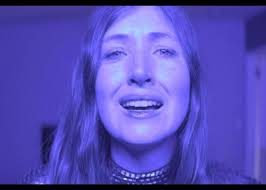

 Midsommar, She Dies Tomorrow is a movie baked in similar mind-bending madness.
Midsommar, She Dies Tomorrow is a movie baked in similar mind-bending madness.
Kate Lyn Sheil plays Amy, a young woman who has just bought her first house. There’s not much else we know about her, except that, when we meet her, she seems to be distracted or depressed, responding in the negative when her friend on the phone asks if she’s alright. When her friend, Jane, played by Jane Adams, arrives, Amy plainly and definitely tells her that she knows she’s going to die the next day. Jane blames Amy’s state of mind on the fact that she’s been drinking and refuses to indulge what she perceives to be another of Amy’s needy games. However, once Jane gets home, she herself becomes overwhelmed with the same certainty that she will also die the next day. As it turns out, this sense of impending death is contagious, as anyone who has it will infect everyone they come in contact with.
The premise is simple and brilliantly surreal. We are all well-versed in the behavior of viruses, and Seimetz crafts a wickedly simple but mind-burrowing concept of what would happen if a belief were a virus, if paranoia was as contagious as a common cold—or, COVID-19. Just as Amy and Jane are infected with this certainty of their own impending mortality, they spread it to everyone else they come in contact with, including Jane’s brother (Chris Messina) and sister-in-law (Katie Aselton), friends and even the doctor she goes to see to check on her assumed health failure. Everyone, in turn, becomes swallowed up in their own sense of their own rapidly-approaching demise, each responding in a different way.
In She Dies Tomorrow, Seimetz has created a black hole of dread which expands exponentially. How long would it take for this nihilistic virus to spread to every human on the planet? What was the source? Will everyone truly die tomorrow? If so, how? The audience is sucked in almost as quickly and definitively as the characters, as we are given no answers, only clues that we may interpret to our will. Cinematographer Jay Keitel and composer Mondo Boys join Seimetz in creating a psychological undertow of shadows, light and sound, illustrating what it just might look and sound like if the world were ending—or if it only felt that way.
To that end, there is a sprinkling of absurdist humor in the horror, as each character reacts differently to their newfound paranoia. Adams and Messina, in particular, find notes in their performances that betray a wholesale commitment to their fates, adding a clever layer of skepticism for the audience that tempers the darkness, if only slightly. In a clever twist on the “characters confessing the truth on a plane that they think is about to crash” trope, the characters here react and reflect on their existences and soon-to-be lack of one with myriad behaviors, Seimetz injecting dark comedy in some unexpected places.
Sheil is the emotional center of the film, and her hypnotic acquiescence to her believed fate sets the tone and atmosphere for this quietly absorbing film. Running a just-right 84 minutes, She Dies Tomorrow takes its time painting the picture, but never lingers too long in its own depth. Seimetz, whose previous film, 2012’s Sun Don’t Shine, which also starred Sheil and was also a mysterious horror-infused drama, seems to have found her voice in spinning tales of dread and dark cynicism. She couldn’t have found a more perfect time to hone her craft.
